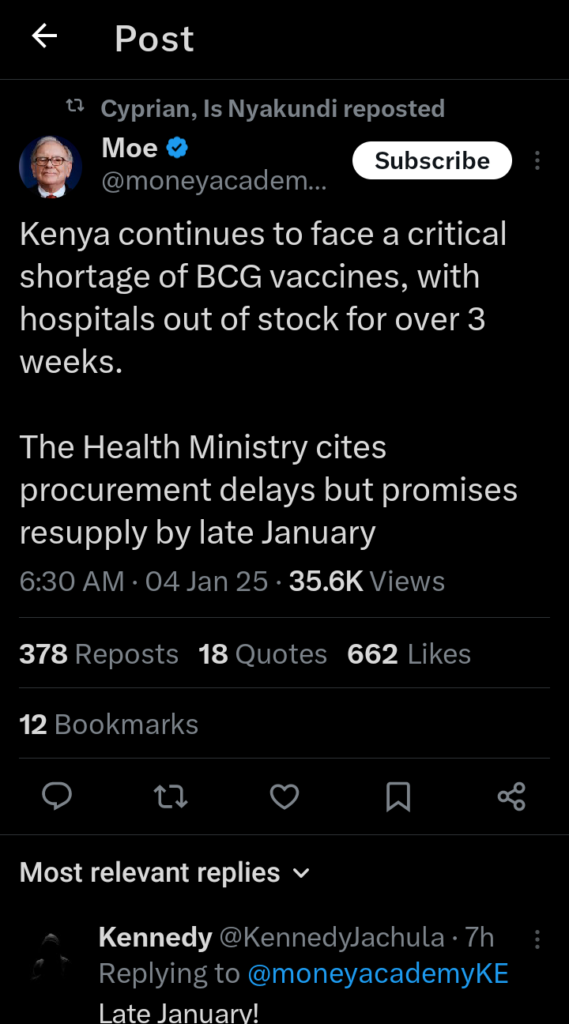Kenya’s ongoing shortage of Bacillus Calmette-Guérin (BCG) vaccines has exposed glaring failures in the Ministry of Health.
For over three weeks, hospitals have been out of stock, leaving newborns and other vulnerable groups at risk of contracting tuberculosis (TB).
This situation has created fear and frustration among parents and healthcare providers, further highlighting the Ministry’s lack of preparedness and mismanagement.
The BCG vaccine is critical in preventing TB, a disease that remains a major public health concern in Kenya.
It is given to infants as part of routine immunization schedules to protect them from severe forms of TB.
Yet, the Ministry of Health has failed to ensure the availability of this life-saving vaccine, citing procurement delays as the excuse.
This explanation, however, raises more questions than answers.
Why were procurement processes delayed in the first place? Why didn’t the Ministry anticipate such challenges and put contingency plans in place?
The claim that supplies will be replenished by late January does little to reassure Kenyans.
Such promises have been made before, yet systemic failures continue to plague the healthcare sector.
Procurement delays are not a new problem, and it is clear that the Ministry has done little to address this recurring issue.
Instead of proactive planning, there is a pattern of reactive responses, often at the expense of the public’s health.
Parents seeking immunizations for their children have been turned away from hospitals, left to worry about the safety of their newborns.

The lack of vaccines exposes children to preventable diseases and leaves families feeling helpless.
This negligence is unacceptable, particularly in a country that has made international commitments to improve healthcare access and outcomes.
This shortage also reflects deeper inefficiencies within Kenya’s healthcare system. While the Ministry blames procurement and global supply constraints, these are not unique challenges.
Other countries facing similar circumstances have managed to maintain vaccine supplies through effective planning and partnerships.
Kenya, however, seems stuck in a cycle of poor governance, lack of accountability, and misplaced priorities.
The Ministry of Health’s inability to secure a consistent supply of vaccines is a symptom of broader institutional failures.
Instead of focusing on addressing critical healthcare needs, resources and attention are often diverted to non-priority areas or questionable projects.
Meanwhile, millions of Kenyans continue to suffer from inadequate healthcare services, further eroding trust in the government.
This situation demands immediate action, not just promises.
The Ministry must overhaul its procurement processes, improve planning, and ensure transparency in how healthcare resources are managed.
Kenyans deserve a healthcare system that prioritizes their needs and delivers on its commitments.
Anything less is a betrayal of public trust and a failure of leadership.
The current vaccine shortage is a stark reminder of the urgent need for reforms in the Ministry of Health, whose actions or lack thereof are putting lives at risk.





















Add Comment